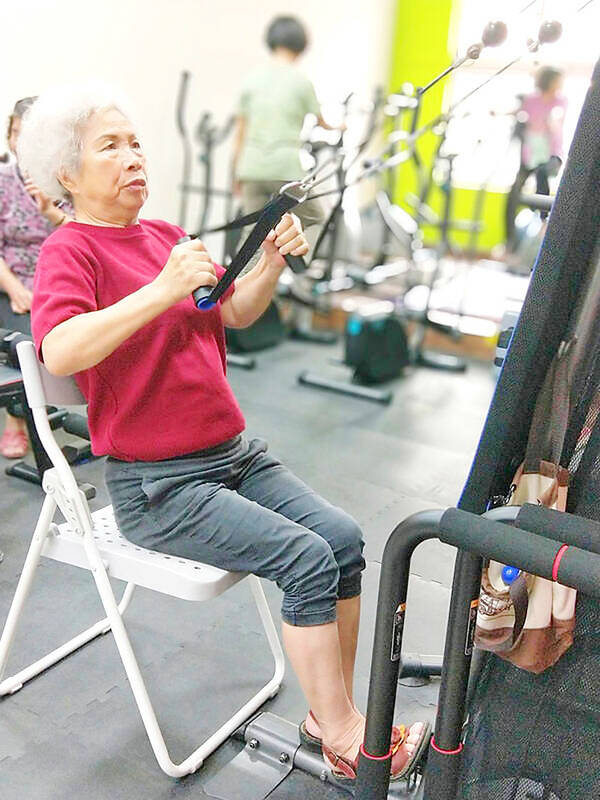Tripping and falling, the second-most cited cause of death for people aged 65 or older, deserves more attention, as Taiwan this year officially becomes a super-aged society, health experts said.
A super-aged society is defined as when an aging population makes up 20 percent of the whole.
Citing Ministry of Health and Welfare statistics, Health Promotion Administration (HPA) Deputy Director-General Wei Hsi-lun (魏璽倫) said on Tuesday that one out of six elderly people have slipped and fallen, while one out of 12 have sought medical treatment for such issues.

Photo: Lin Liang-che, Taipei Times
Taiwan Restorative Care Promotion Association director and occupational therapist Cheng Meng-hsiu (鍾孟修) offered four suggestions to prevent falls.
There are internal and external factors causing elderly people to be more prone to falling, Chung said.
Internal reasons include body functions regressing, chronic diseases, changes to cognitive functions or the patient’s nervous systems, the patient being affected by medication, or the mental state of fear of falling, he said.
Chung added that external factors include the environment, inadequate support equipment, wearing unsuitable shoes and weather.
Actions to help prevent falling should focus on improving vision, hearing, mobility and nutrition, Chung said.
Using visual aids, such as glasses with proper correction, using magnification lenses to help people better identify possible obstacles and improved lighting in the house would help improve vision, he said.
Annual check-ups should be the norm, and if necessary, glasses should be changed to have proper visual corrections, Chung said.
People who are hard of hearing should use hearing aids, as it makes them more alert and delays regression of cognitive functions, he said, adding that environmental sounds within the home should be reduced and safety reminders installed.
Elderly people are encouraged to exercise regularly to maintain muscle mass and their sense of balance, as such acts help them maintain proper pacing and reduce the risk of falling, he said.
Chung suggested placing anti-slip mats and handlebars where elderly people frequent, adding that homes should remove clutter to ensure a safer walking environment.
Nutritionally, elderly people should mind their hydration levels and have a protein-rich diet, while ensuring they keep up on calcium and vitamin D supplements, he said.
A balanced diet and adequate exposure to sunlight would ensure that people have sufficient calcium, protein and vitamin D sources, Chung added.

Taiwan yesterday condemned the recent increase in Chinese coast guard-escorted fishing vessels operating illegally in waters around the Pratas Islands (Dongsha Islands, 東沙群島) in the South China Sea. Unusually large groupings of Chinese fishing vessels began to appear around the islands on Feb. 15, when at least six motherships and 29 smaller boats were sighted, the Coast Guard Administration (CGA) said in a news release. While CGA vessels were dispatched to expel the Chinese boats, Chinese coast guard ships trespassed into Taiwan’s restricted waters and unsuccessfully attempted to interfere, the CGA said. Due to the provocation, the CGA initiated an operation to increase

CHANGING LANDSCAPE: Many of the part-time programs for educators were no longer needed, as many teachers obtain a graduate degree before joining the workforce, experts said Taiwanese universities this year canceled 86 programs, Ministry of Education data showed, with educators attributing the closures to the nation’s low birthrate as well as shifting trends. Fifty-three of the shuttered programs were part-time postgraduate degree programs, about 62 percent of the total, the most in the past five years, the data showed. National Taiwan Normal University (NTNU) discontinued the most part-time master’s programs, at 16: chemistry, life science, earth science, physics, fine arts, music, special education, health promotion and health education, educational psychology and counseling, education, design, Chinese as a second language, library and information sciences, mechatronics engineering, history, physical education

The Chinese military has boosted its capability to fight at a high tempo using the element of surprise and new technology, the Ministry of National Defense said in the Quadrennial Defense Review (QDR) published on Monday last week. The ministry highlighted Chinese People’s Liberation Army (PLA) developments showing significant changes in Beijing’s strategy for war on Taiwan. The PLA has made significant headway in building capabilities for all-weather, multi-domain intelligence, surveillance, operational control and a joint air-sea blockade against Taiwan’s lines of communication, it said. The PLA has also improved its capabilities in direct amphibious assault operations aimed at seizing strategically important beaches,

‘MALIGN PURPOSE’: Governments around the world conduct espionage operations, but China’s is different, as its ultimate goal is annexation, a think tank head said Taiwan is facing a growing existential threat from its own people spying for China, experts said, as the government seeks to toughen measures to stop Beijing’s infiltration efforts and deter Taiwanese turncoats. While Beijing and Taipei have been spying on each other for years, experts said that espionage posed a bigger threat to Taiwan due to the risk of a Chinese attack. Taiwan’s intelligence agency said China used “diverse channels and tactics” to infiltrate the nation’s military, government agencies and pro-China organizations. The main targets were retired and active members of the military, persuaded by money, blackmail or pro-China ideology to steal